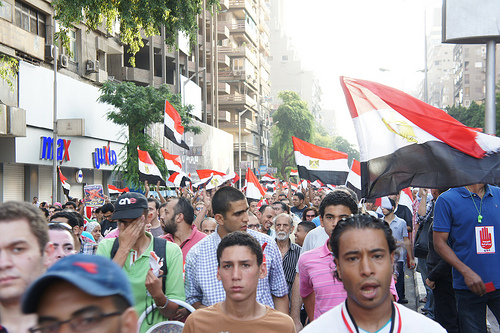June 30th: The Great Sunday
by Hamdy El-Gazzar and translated by Nour Abdelghani / July 15, 2013 / No comments
Millions of Egyptians gather in the streets to call for an end to Muslim Brotherhood rule.

Anti-Morsi protesters gather in Egypt's Tahrir Square. Photo: Zeinab Mohamed via Flickr.
The scene around me was magical, enchanting. I have never seen anything like it before. I was smiling silently, walking amongst the crowds like one might walk in a dream. I was taken aback and mystified. My eyes were unable to take in all of the people. My 10 year-old son’s hand gripped my own. On his chest he wore a red card that said “Leave.”

- “From Egypt” attempts to draw a cultural map of Egypt and the Arab world by profiling the artistic, literary, and political issues that affect the region via on-the-ground coverage of current events, publications, and the fight for freedom of expression.

- Hamdy El-Gazzar is an Egyptian writer and one of the 39 young Arab writers included in the Beirut 39 Project. His first novel, Sihr Aswad (Dar Merit, 2005) won the prestigious Sawaris Award, and was subsequently translated by Humphrey Davies (Black Magic, AUC Press, 2007). His second novel, Ladhdhat Sirriyya (Secret Pleasures) was published by Dar al-Dar in 2008. He is currently working on a third novel.
In his right hand, he raised the flag and in his mouth was a referee’s whistle that he blew in time with the chant: “Egypt. Egypt.”
At 4pm, we stepped out in front of the Ministry of Culture in Zamalek. Thousands of Egypt’s artists, intellectuals, and writers were present, along with the biggest cinema and theatre stars. Beside them were studio artists, journalists, academics, students, workers, and many of the residents of Zamalek.
The street we were on bears the name of the empress “Shagaret El Dor, who died after being beaten with wooden clogs. But on this day, ladies and young women clapped their wooden clogs against one another, beating time to the tune of “Leave. Leave.” Their musical notes rose with the anger of refusing this regime from the middle ages.
“Down, down with the regime of the Morshed.”
“Down down with regime of the Morshed. Down down with all the dogs of the Muorshiid.”
Seniors in their windows and balconies waved flags and chanted along with us: “Leave.”
Egypt was the future of civilization around me. Young women with their bright faces exposed, Muslims and Copts, modern youth with no room for Jalabeyahs or beards or faces hidden behind black cloths.
As we walked the crowd extended along the length of the Zamalek Corniche on its way to the Opera House, certain and insistent, the ground shaking beneath its feet. The whistles, the hand drums, the mouths raising their voices, chanting “Down, down with regime of the Morshed. Down, down with the representative of the Murshid.”
At around 7pm we reached Opera Square and the Kasr el Nil bridge that leads to Tahrir square. We stopped there because there was no more room for anyone else. My eyes could not take in all the people. When I looked in the opposite direction, by the Galaa bridge, I saw other marches coming in, one after the other, from Dokki, Bolak, Al Harm, Faysal, and Giza. God Almighty! The people were crowding next to each other on the west bank of the Nile by Galaa Square all the way over to my spot on the Kasr El Nil bridge. There, in Tahrir Square, millions had arrived before us. I have never in my life seen crowds like these, even on January 28th, 2011. This has never happened in the history of Egypt, or any other nation in the world.
On June 30th, millions of people marched. Some say there were thirty-three million Egyptians, some say less, but one thing is certain: On that day, Egyptians refused religious dominance, extremism, terrorism, violence, and a return to the middle-ages. However, it appears that the widespread terrorism will not surrender without shedding the blood of innocents.




